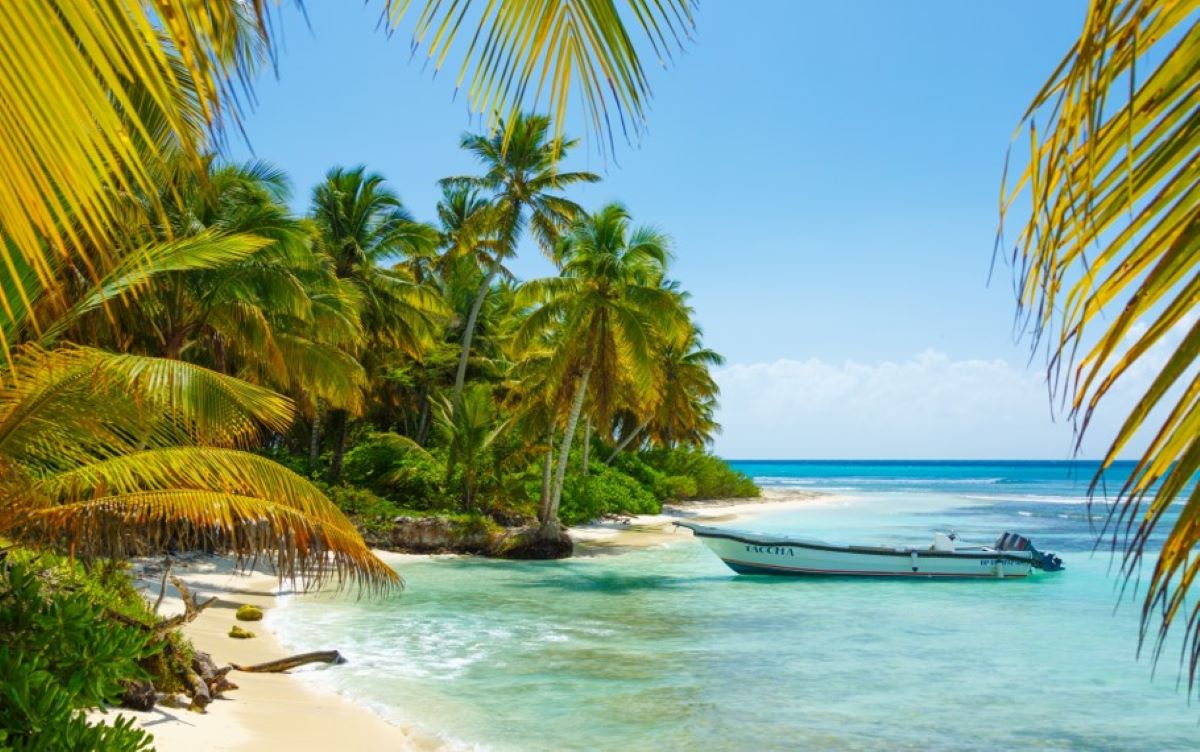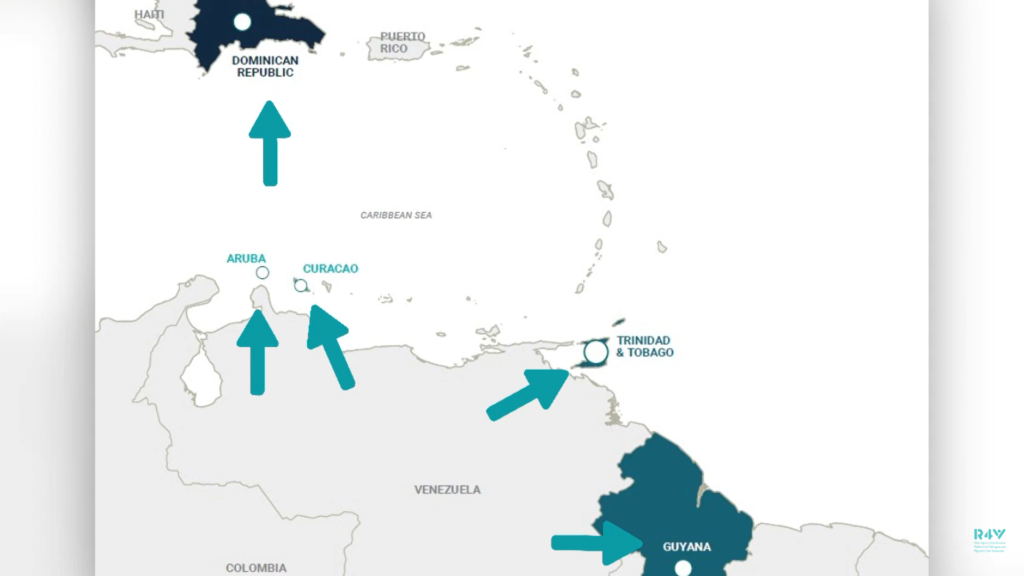Aruba, Curacao, Trinidad and Tobago, Guyana and the Dominican Republic — a list that reads like a travel guide advertising sun-soaked beach vacations for those looking to “get away from it all.” Fittingly, these Caribbean nations have become destinations for a new group of travelers over the past seven years as Venezuelan refugees and migrants have left behind the hardships they faced in their homeland.
Of the estimated 5.6 million people that have left Venezuela since the beginning of the humanitarian crisis in 2014, nearly 200,000 have fled to countries in the Caribbean region. While 200,000 may seem insignificant relative to the total, it is important to remember that this shift in migration can have a significant impact in these five countries that now host the largest numbers of Venezuelan refugees and migrants in the Caribbean.
In Aruba and Curacao, the smallest of these countries by population, a flow of about 17,000 Venezuelans into each now accounts for roughly 16 and 11 percent of their respective populations. To put that in U.S. terms, this rather sudden population growth would be akin to adding the entire population of California.
With their diverse geographic, linguistic, and socio-economic backgrounds, these five countries have taken a variety of approaches to address the challenges posed by movements of refugees and migrants into the Caribbean region. The Venezuelans leaving their homes behind, meanwhile, must overcome daunting obstacles to arrive safely and integrate into their new communities.
Making the Journey
The first step for any refugee or migrant leaving Venezuela for the Caribbean is determining how to reach their intended destination. In the Caribbean region, this typically involves crossing the sea by boat – even to reach Guyana, which shares a land border but lacks road access.
So, why would someone leaving Venezuela choose a water route into the Caribbean rather than a land route into South or Central America? According to the U.S. Department of State, there are a number of factors that play into this decision, including visa requirements, border restrictions and geography. Aruba, Curacao, Trinidad and Tobago and Guyana are all close enough to the Venezuelan coast that they are easily accessible by boat.
However, the State Department also notes that it is often difficult for Venezuelans to meet the requirements for legal entry into these Caribbean countries. This has led to increasing numbers of refugees and migrants entering Caribbean countries irregularly (outside the laws, regulations or international agreements governing the entry into or exit from the state of origin, transit or destination), often forcing them to rely on human traffickers and smugglers.
Despite the proximity of some of these Caribbean destinations to Venezuela, their irregular status and reliance on traffickers and smugglers often makes this a perilous journey.
Challenges Faced Upon Arrival
Having reached one of these Caribbean countries, refugees and migrants face a wide array of new challenges. One of the greatest challenges in the region, according to a State Department spokesperson, is the lack of opportunity to obtain legal status.
“This affects their access to services and livelihoods, opportunities, such as formal accredited education, formal labor markets, and financial systems such as banks, which can leave Venezuelans particularly vulnerable and hinder their social and economic integration and well-being.”
Another challenge is learning the local language. Of these five countries, only the Dominican Republic (the farthest away from Venezuela) lists Spanish as its official language. In Aruba and Curacao, the dominant languages are Dutch and Papiamento, while English is the official language of Trinidad and Tobago and Guyana.
In the Caribbean as well as South and Central America, xenophobia towards Venezuelans as outsiders in host countries factors into perceptions of refugees and migrants. With no end in sight to the humanitarian crisis, there have been reports of “compassion fatigue” and a rise in xenophobic behaviors in host countries throughout these regions.
Pandemic Effects
Compounding all of these issues is the global COVID-19 pandemic. For host countries and Venezuelans alike, the health and economic effects of the pandemic have taken a toll throughout the region.
Returning to the idea of irregular status for these refugees and migrants, the COVID-19 pandemic has caused countries to tighten border enforcement measures. As a result, Venezuelan migrants and refugees have found it more difficult to enter these countries with a regular status, leaving them vulnerable to exploitation and abuse.
In the Caribbean, national economies dependent on tourism have been devastated by the prolonged halt in travel. With the rising numbers of Venezuelan refugees and migrants now representing significant increases to their populations, resources and public services in these five countries have been particularly strained.
With the virus circulating among their populations, treating COVID-19-related illness among this subset population and vaccinating migrant populations are challenges that weigh heavily on host country governments. At the time of writing, however, all of these countries except the Dominican Republic have included refugees and migrants in their national vaccination plans.
The economic impact of COVID-19 has also affected the ability of Venezuelan refugees and migrants to access the labor market through formal channels. A State Department spokesperson cited Aruba as an example where Venezuelans in the country have lost guarantors for work permits due to the economic crisis, which forced the closure of businesses. As such, many refugees and migrants who had been on the island for lengthy periods with regular status, now risk being in irregular situations.
Perhaps unsurprisingly, Venezuelan refugees and migrants in the Caribbean have been disproportionately affected by the pandemic relative to their host communities. For subsets of these countries’ populations that are least likely to have legal status, speak the language or benefit from public services, the pandemic has amplified existing vulnerabilities and further limited access to food and health care, employment and other income-generating activities, education and protection services.
Addressing the Situation
With all of these challenges, what is being done on an international level to address the situation and to help Venezuelans, host communities and host countries in the Caribbean region?
Regional Refugee and Migrant Response Plan (RMRP) for Venezuela
The RMRP was first developed in 2018 by the United Nations Office for the Coordination of Humanitarian Affairs as a “strategic regional response plan and advocacy tool” to coordinate humanitarian efforts related to the ongoing Venezuelan crisis. Due to significant movements of people out of Venezuela and into host countries, the RMRP is primarily meant to coordinate efforts of governments, international organizations and NGOs to more effectively assist refugees and migrants from Venezuela as well as affected host communities throughout the region.
U.S. Department of State – Bureau of Population, Refugees, and Migration (PRM)
In line with the RMRP for Venezuela, PRM provides humanitarian assistance in Aruba, Curacao, Trinidad and Tobago, Guyana, and the Dominican Republic, the five countries hosting the largest numbers of Venezuelan refugees and migrants in the Caribbean region. Of the over $1 billion in humanitarian assistance the U.S. has provided inside Venezuela and throughout the region since 2017, PRM has provided nearly $441 million to its international and non-governmental organization partners.
According to a State Department spokesperson, this assistance includes shelter for the most vulnerable; safe drinking water and hygiene supplies; food and nutrition support; protection from violence and exploitation; and access to work, education, legal assistance and medical care.
Additionally, PRM engages diplomatically at the highest levels with host countries in the region, both directly and through international initiatives like the Quito Process, to ensure protection mechanisms are in place, including access to territory, asylum, and legal status. Because securing asylum is so key to the safety and well-being of refugees and migrants in the region and gaining legal status grants access to public services and the opportunity to make a living, both of these goals continue to be top priorities for the U.S. in the region.

